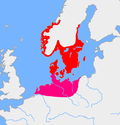Germanic given names are traditionally dithematic; that is, they are formed from two elements, by joining a prefix and a suffix. For example, King Æþelred's...
59 KB (1,327 words) - 01:40, 24 December 2024
the Germanic languages Germanic name Germanic mythology, myths associated with Germanic paganism Germanic religion (disambiguation) SS Germanic (1874)...
797 bytes (121 words) - 17:25, 11 December 2021
The Germanic peoples were tribal groups who lived in Northern Europe in Classical Antiquity and the Early Middle Ages. In modern scholarship, they typically...
164 KB (20,237 words) - 22:30, 1 January 2025
Germanic names, inherited from the Suevi (who settled in Gallaecia: modern Galicia and northern Portugal in 409 AD), Visigoths, Vandals, Franks and other...
60 KB (1,739 words) - 12:21, 3 January 2025
Germanic names in Italy started to proliferate after the fall of the Roman Empire due to the Barbarian Invasions of 4th-6th centuries. Early studies of...
4 KB (429 words) - 08:21, 5 September 2023
Germanic paganism or Germanic religion refers to the traditional, culturally significant religion of the Germanic peoples. With a chronological range...
128 KB (15,974 words) - 21:56, 23 December 2024
Proto-Germanic eventually developed from pre-Proto-Germanic into three Germanic branches during the fifth century BC to fifth century AD: West Germanic, East...
131 KB (12,257 words) - 13:44, 1 January 2025
Continental Germanic mythology. It was a key element of Germanic paganism. As the Germanic languages developed from Proto-Indo-European language, Germanic mythology...
9 KB (973 words) - 19:50, 30 July 2024
Genevieve (French: Geneviève) is a female name of "Celtic or Germanic origin, possibly from the Germanic name [Kenowefa Latinized as] Genoveva, meaning...
6 KB (633 words) - 06:26, 2 January 2025
Proto-Germanic paganism was the beliefs of the speakers of Proto-Germanic and includes topics such as the Germanic mythology, legendry, and folk beliefs...
76 KB (1,948 words) - 19:31, 4 January 2025
during séances. Ancient Roman and Greek literature records the name of several Germanic seeresses, including Albruna, Veleda, Ganna, and, by way of an...
87 KB (11,375 words) - 03:12, 14 December 2024
The Germanic languages are a branch of the Indo-European language family spoken natively by a population of about 515 million people mainly in Europe,...
94 KB (9,575 words) - 07:54, 3 January 2025
The West Germanic languages constitute the largest of the three branches of the Germanic family of languages (the others being the North Germanic and the...
56 KB (4,741 words) - 10:40, 8 January 2025
The list of early Germanic peoples is a register of ancient Germanic cultures, tribal groups, and other alliances of Germanic tribes and civilisations...
105 KB (6,522 words) - 10:59, 27 November 2024
Arminius (section Germanic sagas)
18/17 BC–AD 21) was a chieftain of the Germanic Cherusci tribe who is best known for commanding an alliance of Germanic tribes at the Battle of the Teutoburg...
39 KB (4,474 words) - 19:43, 6 January 2025
North Germanic peoples, Nordic peoples and in a medieval context Norsemen, were a Germanic linguistic group originating from the Scandinavian Peninsula...
91 KB (10,688 words) - 22:17, 18 December 2024
Rune (redirect from Germanic rune)
alphabets known as runic alphabets native to the Germanic peoples. Runes were used to write Germanic languages (with some exceptions) before they adopted...
68 KB (6,920 words) - 02:20, 8 January 2025
William (redirect from William (given name))
the Old Norse name Vilhjalmr and a West Germanic borrowing into Medieval Latin Willelmus. The Proto-Germanic name is a compound of *wiljô "will, wish, desire"...
11 KB (808 words) - 06:49, 29 December 2024
Leopold is the modern form of the Germanic name Luitbald, composed of two stems, common to Germanic names. The first part is related to Old High German...
8 KB (742 words) - 23:13, 25 February 2024
free dictionary. Alicia is a feminine given name. It is a variant of Alice, which comes from the Germanic name Adalheidis (Adelaide), meaning "noble natured"...
14 KB (1,593 words) - 11:58, 5 January 2025
Germanic law is a scholarly term used to describe a series of commonalities between the various law codes (the Leges Barbarorum, 'laws of the barbarians'...
47 KB (5,889 words) - 07:48, 2 November 2024
conjugation of Germanic strong verbs such as sing/sang/sung. While Germanic umlaut has had important consequences for all modern Germanic languages, its...
55 KB (5,472 words) - 20:43, 2 January 2025
latinicized Germanic name Adefonsus). Álvarez (from medieval Alvares, from the Germanic name Halvar(d), latinicized as Alvarus). Ares (from the name Arias or...
85 KB (10,030 words) - 00:54, 8 January 2025
is Theodor. Although similar to, and probably influenced by it, the Germanic name Theodoric (and variants Theodoricus, Dietrich, Thierry, and others)...
17 KB (1,260 words) - 20:57, 25 December 2024
Gaut (category Germanic mythology)
Gaut is an early Germanic name, from a Proto-Germanic gautaz, which represents a mythical ancestor or national god in the origin myth of the Geats. Gautaz...
4 KB (502 words) - 21:01, 31 December 2024
Germanic toponyms are the names given to places by Germanic peoples and tribes. Besides areas with current speakers of Germanic languages, many regions...
45 KB (2,342 words) - 07:23, 3 January 2025
In Germanic paganism, the indigenous religion of the ancient Germanic peoples who inhabit Germanic Europe, there were a number of different gods and goddesses...
21 KB (696 words) - 02:19, 21 December 2024
Charles (redirect from Charles (name))
masculine given name predominantly found in English and French speaking countries. It is from the French form Charles of the Proto-Germanic name ᚲᚨᚱᛁᛚᚨᛉ (in...
40 KB (2,900 words) - 17:19, 2 January 2025
Jakob "Jacob" and "James"; Anna, Maria, Barbara, Christina) or from Germanic names (Friedrich "Frederick", Ludwig "Louis", etc.) Since the 1990s, there...
37 KB (4,186 words) - 15:09, 12 December 2024
Germania (category CS1 interwiki-linked names)
(English: Great Germania), Germania Libera (English: Free Germania), or Germanic Barbaricum to distinguish it from the Roman provinces of Germania Inferior...
28 KB (2,948 words) - 15:00, 16 August 2024
















